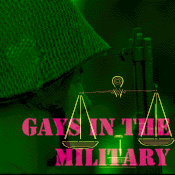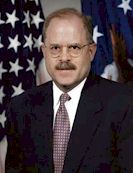 |

 Record Numbers for Being Gay to Meet with SLDN Activists Since "Don't Ask" Became U.S. Policy |
|
Compiled By GayToday
 Washington, D.C.--- The Pentagon released late
last week its gay discharge figures for Fiscal Year 1998. The figures show
that the Pentagon marked the fifth anniversary of "Don't Ask, Don't Tell,
Don't Pursue" by firing a record 1145 people for being gay in the past
year under the current policy.
Washington, D.C.--- The Pentagon released late
last week its gay discharge figures for Fiscal Year 1998. The figures show
that the Pentagon marked the fifth anniversary of "Don't Ask, Don't Tell,
Don't Pursue" by firing a record 1145 people for being gay in the past
year under the current policy.
The number of discharges is a 92% increase in gay discharges since "Don't Ask, Don't Tell, Don't Pursue" was implemented in 1994. The discharge figures also represent the largest number of gay discharges in more than a decade. C. Dixon Osburn, Co-Executive Director of Servicemembers Legal Defense Network (SLDN) said, "These numbers are shameful. Military leaders have turned a blind eye to the continued asking, pursuit and harassment of gays, lesbians and bisexuals serving our country. What will have to happen before the Pentagon turns its ship around?" SLDN is an independent legal aid and watchdog group that monitors the "Don't Ask, Don't Tell, Don't Pursue" policy. Late Friday, Acting Secretary of the Air Force, Whit Peters, agreed to meet with SLDN's C. Dixon Osburn and Michelle M. Benecke. Acting Secretary Peters also invited Mr. Osburn and Ms. Benecke to meet with officials at Lackland Air Force Base in San Antonio, Texas, a basic training command that accounted for 65% of the Air Force's gay discharges last year.
"We look forward to the meetings," stated C. Dixon Osburn, Co-Executive Director of SLDN. "The discharge figures at Lackland are very disturbing. We plan to ask some searching questions about the command climate and why the discharge figures at Lackland are so disproportionate."
C. Dixon Osburn says:, "The Pentagon's spin that gays are voluntarily coming out is disingenuous and tells us nothing. The real question is why are people making statements. The Pentagon is not telling you that so-called 'voluntary statements' include statements: Made to psychotherapists, as in the case former Marine Corporal Kevin Blaesing Made in personal diaries, as in the case of former West Point Cadet Nicole Galvan Contained in anonymous online profiles, as in the case of Master Chief Petty Officer Timothy McVeigh Made after being asked, as in the case of former SS3 Kelli Sprague Made in federal court documents as in the case of Able v. USA Coerced out of the service member due to fear, intimidation, assaults, death threats, threats of criminal prosecution and hostile command climates, as in the cases of former Air Force Major Bob Kittyle, former Marine Lance Corporal Kevin Smith, four sailors aboard the USS Eisenhower and former Seaman Amy Barnes "The Pentagon would have you believe that these are all 'voluntary' statements," Osburn added. "The Pentagon is simply hiding the ball." Michelle M. Benecke stated, "A logical response to the disproportionate number of gay discharges would have been for military leaders to look into the command climate in military units. Is the command climate openly hostile to lesbian, gay and bisexual service members? Are officials herding people out who are or are perceived as gay in violation of military regulations? Are they forcing heterosexuals out that they do not like under guise of this policy? Are officials forgoing use of entry level separations and using the 'Don't Ask, Don't Tell, Don't Pursue' policy for ulterior reasons? How do gay discharges at Lackland compare to gay discharges at other training sites for the Navy and Army? "These are some of the very basic questions that we would ask that the Pentagon and Air Force apparently have not," Benecke said. Osburn stated, "The Pentagon might have some credibility if it had taken concrete steps to improve implementation of 'Don't Ask, Don't Tell, Don't Pursue,' but they have not. None of the recommendations made in the Pentagon's April 1998 policy have been implemented." The recommendations in the Pentagon's April 1998 report included issuing guidance to: Prohibit pretrial agreements or "plea bargains" to obtain evidence of consensual homosexual conduct; Protect servicemembers from investigations so that they can report anti-gay harassment or lesbian-baiting without fear of reprisal; Limit the scope of investigations to prevent fishing expeditions; and Require commanders to consult with higher headquarters before initiating investigations into alleged homosexuality; Provide necessary and effective training on the limits to investigations under "Don't Ask, Don't Tell, Don't Pursue." SLDN reports that none of these recommendations have been implemented. SLDN will release its annual report on "Don't Ask, Don't Tell, Don't Pursue" on the fifth anniversary of the policy at the end of February. The report will provide details about the Pentagon's ongoing campaign against gays, lesbians and bisexuals serving our country. |


